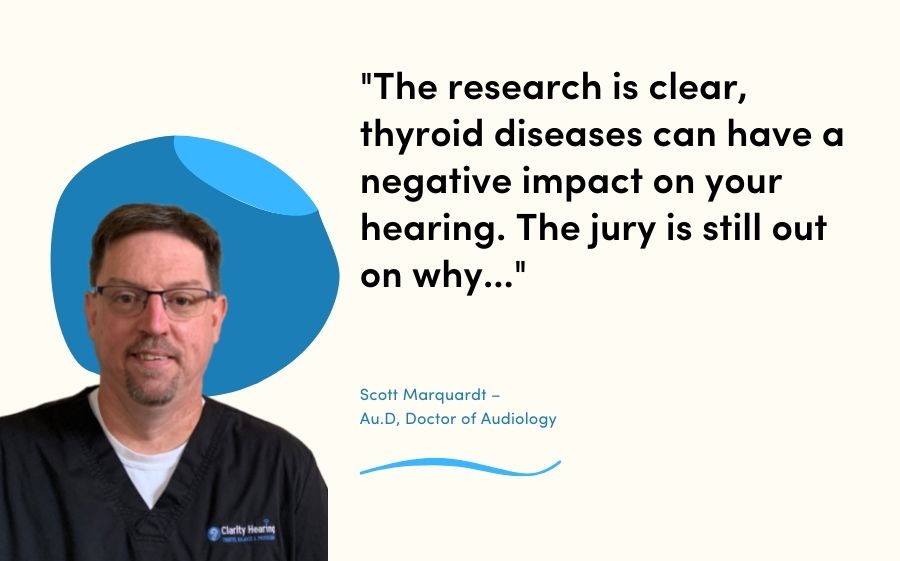It’s shaped like a butterfly, about the size of a plum and sits just below your voice box. It is of course, your thyroid gland. Its job is to regulate your metabolism by releasing hormones. If you have thyroid disease, your thyroid gland may be producing too little or too much of these all-important hormones. You’re probably already familiar with the consequences, which include weight loss or gain, fatigue and headaches. But did you know thyroid disease can also affect your hearing?
A mysterious link
The research is clear, thyroid diseases can have a negative impact on your hearing. The jury is still out on why, but several thyroid diseases, including Hashimoto’s Disease, Grave’s Disease, and Pendred Syndrome have all been linked to hearing loss.
When it comes to thyroid cancer, hearing loss is often the result of treatment to cure the cancer, specifically radiation and anti-cancer drugs that damage cells in the ears responsible for hearing.
What can do to keep your thyroid healthy?
If you already have thyroid disease, it is important to follow your doctor’s advice and continue to take any medication you have been prescribed. If you do not yet have thyroid disease, there are several things you can do to help keep your thyroid healthy:
Eat healthily
This means avoiding junk food and eating foods with high levels of antioxidants, such as tomatoes, blueberries and squash. It is also good to limit the amount of raw cruciferous vegetables you eat, such as cabbage, broccoli and kale; enjoy them cooked instead.
Exercise
A little exercise 5 times a week goes a long way. It increases your blood circulation, helps your thyroid function and boosts your metabolism, which also reduces your risk for thyroid disease.
Include iodine in your diet
Those hormones that your thyroid gland produces require a key ingredient: iodine. A lack of iodine can prevent your thyroid producing enough of these hormones. You can make sure your diet has enough iodine in it by eating products fortified with iodine, which includes eggs, dairy products and iodized salt. But it is important not to go overboard with this as too much iodine can be dangerous too. So make sure you speak to your doctor first, who can tell you whether or not you need more iodine in your diet.
Take your vitamins and minerals
Vitamins A and D, as well as iron and selenium are all important for maintaining a healthy thyroid gland. But as always, you should not be taking these supplements unless it is clear that you need them, which is why you should speak to your doctor first.
Listen up
If you have thyroid disease, then you’re likely already doing all you can to keep your thyroid as healthy as possible. But now you know that your hearing could be affected, it is important to also look out for your hearing health. Have you been experiencing any difficulty hearing certain sounds? Have you been straining to hear the TV more than usual? Do you find yourself needing to turn the volume up on your cell?
If you’re already experiencing signs of hearing loss or are worried about your hearing health, then click here to get in touch with us at Clarity Hearing, we’re a locally owned and operated Audiology clinic with offices in The Woodlands, Conroe, Cypress and the Willowbrook area.




